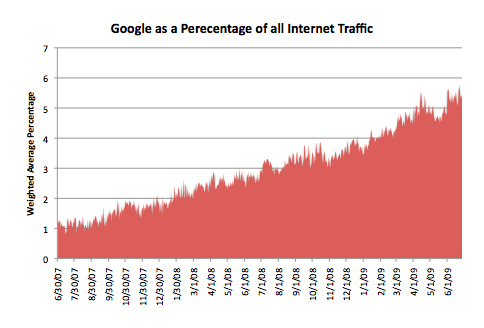Google is as big as the third largest ISP
Networks aren't just about dumb pipes anymore, and Google is well aware of it, according to one industry expert.


Google's not just the biggest search firm on the web, it's infrastructure and networks would make it the third largest ISP in the world.
That's according to Arbor Networks, which claimed that if Google were an Internet Service Provider (ISP) it would be the fastest growing one in the world and the third largest, too.
Arbor Networks' chief scientist Craig Labovitz noted that the top two providers are carrying a lot of Google's traffic, too.

"Everyone recognises Google is big. I think when you start to put it in context as how big and how much of the world's internet traffic that they are contributing can be somewhat of a surprise," he told IT PRO.
He noted that the carriers that Google is ranking alongside have tens of thousands of customers and enterprises - but its own network is just for itself. "Google is of course just one company, and to have them be larger than many of the global transit carriers who are in the business of transiting traffic, I think in some sense shows the sheer size of Google."
Google isn't the only big web firm rolling out its own massive infrastructure. "We're seeing very similar moves from Microsoft, from Yahoo, from Facebook and others. Google may just be a little bit more out ahead in some of these trends than others, but Microsoft is certainly perusing a similar effort," he added.
Labovitz explained that Google started off competing in content, like video and search. Then the firm built up its data centres and started directly interconnecting with consumer networks, instead of requiring transit from carriers.
Sign up today and you will receive a free copy of our Future Focus 2025 report - the leading guidance on AI, cybersecurity and other IT challenges as per 700+ senior executives
"If you follow this progression, the next phase, as they try to get closer and closer to the consumer, is to connect directly with the consumer," he said, which explains its move to roll out its own superfast broadband in the US.
"If you're concerned about how fast the videos are loading and how many videos you can serve, then increasingly taking out intermediate steps and barriers is certainly part of the strategy."
Labovitz said this shows how much the internet game is changing. "The nature of the competition is changing. It's not just dumb pipes anymore. It's a global competition to build out data centres and get content as close to the consumers and the enterprise. It's a real race that's on."
Freelance journalist Nicole Kobie first started writing for ITPro in 2007, with bylines in New Scientist, Wired, PC Pro and many more.
Nicole the author of a book about the history of technology, The Long History of the Future.
-
 OpenAI's 'Skills in Codex' service aims to supercharge agent efficiency for developers
OpenAI's 'Skills in Codex' service aims to supercharge agent efficiency for developersNews The Skills in Codex service will provide users with a package of handy instructions and scripts to tweak and fine-tune agents for specific tasks.
-
 Cloud infrastructure spending hit $102.6 billion in Q3 2025
Cloud infrastructure spending hit $102.6 billion in Q3 2025News Hyperscalers are increasingly offering platform-level capabilities that support multi-model deployment and the reliable operation of AI agents
